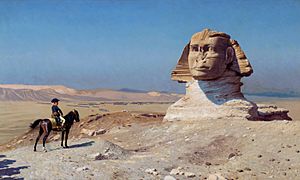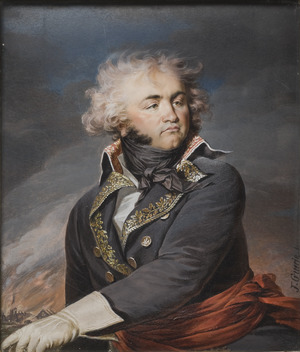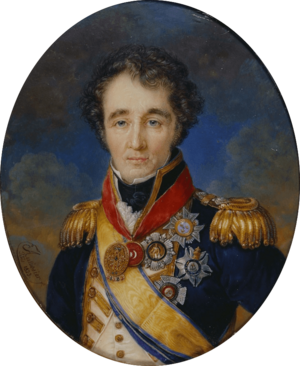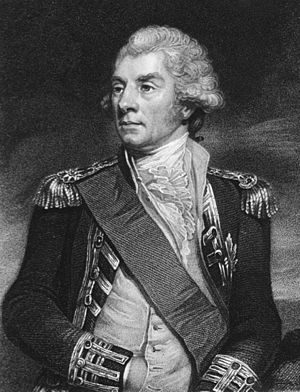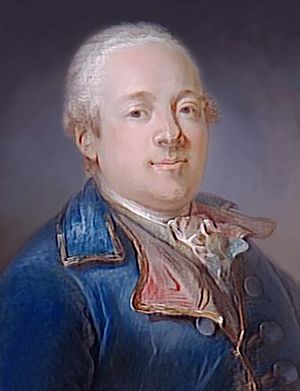Convention of El Arish facts for kids
The Convention of El Arish was an agreement signed on January 24, 1800. It was meant to end the fighting between France and the Ottoman Empire in Egypt. The idea was for French soldiers to go back home and for the Ottomans to get their land back. A British representative was there when it was signed.
However, the British government had sent orders saying they didn't want this kind of agreement. These orders arrived too late. When the French commander, Jean-Baptiste Kléber, found out, he was very angry. He attacked the Ottoman army and won a big battle called the Battle of Heliopolis on March 20. Even though the British government later agreed to the convention, it was too late. The fighting continued until the French finally gave up in August 1801. After that, the French soldiers were sent home on British ships, just like the original agreement said.
Why the French Were in Egypt
In 1798, France sent an army to Egypt. This army was led by Napoleon Bonaparte. At the time, Egypt was part of the Ottoman Empire. The French army first had success, taking control of important cities.
But then, Napoleon led his troops into Syria, where they faced defeat. After winning another battle in Egypt called the Battle of Abukir in July 1799, Napoleon decided to return to France. He left General Jean-Baptiste Kléber in charge of the French army in Egypt.
The French army was in a tough spot. Ottoman forces, led by Kör Yusuf Ziyaüddin Pasha, were moving in from Syria. Many French soldiers were also close to refusing orders because Napoleon had left them.
Making the Agreement
General Kléber decided to try for peace. He contacted Commodore Sidney Smith, who was in charge of the local British navy. Historians still debate if either man had the full power to make such a big agreement. But since their governments were two months away by travel, they decided to go ahead. They started talking through letters.
Kléber said that for peace to happen, his soldiers needed to leave Egypt. They wanted to travel on Ottoman ships with all their gear and weapons. He also asked for safe travel, meaning no attacks from Ottoman forces. Kléber wanted the Ottoman Empire to end its alliance with Britain and Russia. He also demanded that the Ottomans pay for feeding and housing the French soldiers until they could leave. Finally, Kléber wanted all fighting and movement of Ottoman troops to stop right away. Yusuf, the Ottoman leader, refused this last point.
During these talks, about 250 French soldiers at El Arish rebelled. They let Ottoman forces take over the town. The Ottomans began attacking the French soldiers until a British officer stopped them. Soon after, Smith, Yusuf, and two of Kléber's officers met in El Arish to talk.
Yusuf agreed to provide safe passage and transport back to France. But he would not agree to the other requests. Kléber then dropped his demand for the Ottoman troops to stop moving. He also agreed that the alliance between the Ottomans, Russia, and Britain could stay until a formal peace treaty was signed. Kléber still insisted that the Ottoman Empire pay for the French troops' food and care until they could leave. Yusuf agreed to these new terms. The agreement was signed on January 24, 1800. Sidney Smith did not sign the document himself.
What Happened Next
Kléber officially approved a copy of the agreement on January 26. Copies signed by Yusuf and Kléber were formally exchanged on January 30. French soldiers then moved to Alexandria, Aboukir, and Rosetta to wait for ships.
However, Sidney Smith's commander, Lord Keith, had received orders from London. These orders, dated December 15, 1799, said he should not allow any separate agreements between the Ottomans and France. The orders also said that French troops should only surrender as prisoners of war. Lord Keith sent a letter with this information to Smith from his base. But this letter did not reach Smith until after the agreement was signed.
Smith told Kléber on February 21 that the agreement was not valid because it was only between the Ottomans and France. But he hoped the British government would change its mind. Lord Keith also supported the agreement when he heard about it. However, he still sent a letter to Kléber explaining his orders, which demanded that the French surrender completely.
This letter reached Kléber in Cairo on March 18. By this time, Yusuf had moved an army of 40,000 men near Heliopolis. Kléber was furious. He led his troops against Yusuf's army. On March 20, he heavily defeated the Ottoman forces in the Battle of Heliopolis.
Sadly, Kléber was killed in Cairo on June 14 by a student named Suleiman al-Halabi. General Jacques-François Menou took over as the new French commander. Meanwhile, the British government, led by William Pitt the Younger, received a copy of the agreement and decided to accept it.
However, a British messenger did not reach the French troops until August 22. By then, General Menou was feeling hopeful about French chances in the war and refused to let the messenger into Alexandria. The messenger tried to tell the French soldiers that the British would let them go home, but he was turned away. When the British government heard about this refusal, they decided to launch a new attack to force the French out of Egypt. This attack was successful. It led to the surrender of French forces at Alexandria in August 1801. After that, the French soldiers were sent home on British ships, just as the original agreement had planned.
Images for kids
 | Laphonza Butler |
 | Daisy Bates |
 | Elizabeth Piper Ensley |


